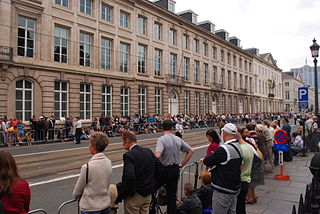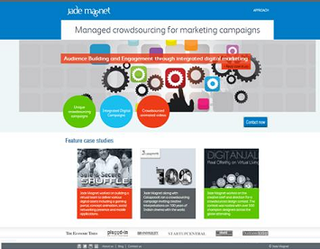
BNP Paribas is a multinational universal bank and financial services holding company. It was founded in 2000 from the merger of Banque Nationale de Paris and Paribas, formerly known as the Banque de Paris et des Pays-Bas. With 190,000 employees, the bank is organized into three major business areas: Commercial, Personal Banking & Services (CPBS), Investment & Protection Services (IPS) and Corporate & Institutional Banking (CIB).

Fortis, formally Fortis N.V./S.A., was a Benelux-centered global financial services group active in insurance, banking and investment management, initially formed in 1990 by a three-way Belgian-Dutch merger and headquartered in Brussels. It grew rapidly through multiple acquisitions, and in 2007 was the 20th largest financial services business in the world by revenue. It was listed on the Euronext Brussels, Euronext Amsterdam, and Luxembourg stock exchanges.

Crowdsourcing involves a large group of dispersed participants contributing or producing goods or services—including ideas, votes, micro-tasks, and finances—for payment or as volunteers. Contemporary crowdsourcing often involves digital platforms to attract and divide work between participants to achieve a cumulative result. Crowdsourcing is not limited to online activity, however, and there are various historical examples of crowdsourcing. The word crowdsourcing is a portmanteau of "crowd" and "outsourcing". In contrast to outsourcing, crowdsourcing usually involves less specific and more public groups of participants.
Crowdreviewing is the practice of gathering opinion or feedback from a large number of people, typically via the internet or an online community; a portmanteau of "crowd" and "reviews". Crowdreviewing is also often viewed as a form of crowd voting which occurs when a website gathers a large group's opinions and judgment. The concept is based on the principles of crowdsourcing and lets users submit online reviews to participate in building online metrics that measure performance. By harnessing social collaboration in the form of feedback individuals are generally able to form a more informed opinion.
Sellaband was a music website that allowed artists to raise the money from their fans and the SellaBand community in order to record a professional album. Sellaband used the mechanisms of crowdfunding and was to be seen as a Direct-to-Fan/fan-funded music platform utilising a Threshold Pledge System / Provision Point Mechanism. It was set up by Johan Vosmeijer, Pim Betist, and Dagmar Heijmans in August 2006. Its offices used to be located in Amsterdam, Netherlands, but it was originally incorporated in Bocholt, Germany.

Habib Haddad is a serial entrepreneur and early stage investor. He is currently the president and managing director of the E14 Fund that invests in spin-offs from MIT. Investments include ThruWave, Formlabs, Kiwi, Figur8, Affectiva, Wise Systems. Haddad has founded a number of tech companies including Wamda, Yamli, YallaStartup, and others.

Ageas is a Belgian-French multinational insurance company co-headquartered in Brussels. Ageas is Belgium's largest insurer and operates in 14 countries worldwide. The company was renamed from Fortis Holding in April 2010 and consists of those insurance activities remaining after the breakup and sale of the financial services group Fortis during the financial crisis of 2007-2010.

Jade Magnet was an online Crowdsourcing platform for creative and marketing support services. It was founded in 2009 by Sitashwa Srivastava and Manik Kinra. The company is headquartered in Bangalore, India and has white label partnerships in Qatar as Mixilion and in Singapore as id8on.

The United Nations Climate Change Conference, COP19 or CMP9 was held in Warsaw, Poland from 11 to 23 November 2013. This is the 19th yearly session of the Conference of the Parties to the 1992 United Nations Framework Convention on Climate Change (UNFCCC) and the 9th session of the Meeting of the Parties to the 1997 Kyoto Protocol. The conference delegates continue the negotiations towards a global climate agreement. UNFCCC's Executive Secretary Christiana Figueres and Poland's Minister of the Environment Marcin Korolec led the negotiations.

Koen Geens is a Belgian jurist and politician of the Christian Democratic and Flemish (CD&V) who served as the Minister of Justice and as Deputy Prime Minister in the governments of Prime Ministers Charles Michel and Sophie Wilmès.
Return on Change (RoC) is an equity crowdfunding platform that connects investors with innovative and socially conscious startups. Return on Change works with startups that operate in five sectors, each of which touches on sustainability in some way: cleantech, edtech, life sciences, social enterprises, and technology. An online equity crowdsourcing platform, RoC helps socially conscious ventures raise capital.

BNP Paribas Bank Polska is a Polish bank, originally founded in 1975 as Bank Gospodarki Żywnościowej (BGŻ). It has been owned by BNP Paribas since 2015, and adopted its brand name in 2019.

Hello bank! is a digital direct bank owned by BNP Paribas that started operations in 2013. The bank operates in France, Belgium, Germany, Italy, the Czech Republic and Austria. BNP Paribas has claimed that it is "the first 100% digital mobile bank in Europe".
OurCrowd is an online global venture investing platform that empowers institutions and individual accredited investors to invest and engage in emerging technology companies at an early stage while still privately held. Based in Jerusalem, the company launched in February 2013, and has since opened overseas branches in the United States, the United Kingdom, Canada, Australia, Spain, Singapore, Brazil, and the UAE.
Equity crowdfunding is the online offering of private company securities to a group of people for investment and therefore it is a part of the capital markets. Because equity crowdfunding involves investment into a commercial enterprise, it is often subject to securities and financial regulation. Equity crowdfunding is also referred to as crowdinvesting, investment crowdfunding, or crowd equity.

DigVentures is a social enterprise organising crowdfunded archaeological excavation experiences. It is registered with the Chartered Institute for Archaeologists (CIfA), and is a CIfA Accredited Field School.
Crowdfunding is the practice of funding a project or venture by raising money from a large number of people, typically via the internet. Crowdfunding is a form of crowdsourcing and alternative finance. In 2015, over US$34 billion was raised worldwide by crowdfunding.
Impact Guru is a donation based crowdfunding platform for NGOs, social enterprises, startups and individuals. It was launched by Maneka Gandhi, Union Cabinet Minister for Women & Child Development, Government of India in September 2015.
Rola Hallam is a British-Syrian consultant anaesthetist, humanitarian, international advocate and speaker and the founder of CanDo; a social enterprise that enables local, frontline healthcare workers to provide healthcare to their own war-affected communities. She is a 2018 TED Fellow.
CrowdJustice is a commercial crowdfunding platform in the United Kingdom and the United States for projects aimed at improving access to the legal system.










